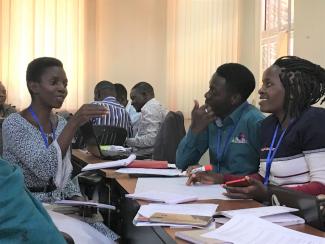
Creating a more equitable research system: lessons from Uganda
Download publication files
Research in Uganda has grown significantly in recent years, supported by investments and a strong policy framework. However, the output numbers of Ugandan research publications remain low for the size of the country and many early career researchers struggle to access support and grants. Women, being a minority in the Ugandan research system, face additional barriers.
Having recognised this, the Uganda National Council for Science and Technology (UNCST) and INASP worked in partnership from 2019 to 2022 to strengthen and make the Ugandan research system more equitable.
Key achievements
-
Formation of the Gender Equity in Research Alliance (GERA) with a strong regional presence throughout Uganda. GERA’s vision is “a gender equitable research system that supports national development”. The alliance consists of four regional chapters – Central Region, Eastern Region, Northern Region and Western Region – which are coordinated by committed volunteers.
-
Establishment of the National Research Repository of Uganda (NRU). The objective of the repository is to process, collect, store and share research outputs by facilitating exchange of information among researchers, scientists and research institutions through ensuring effective coordination of Uganda’s knowledge ecosystem.
-
Incorporation of GERA and NRU into the UNCST strategic plan. Continuing to promote research equity is embedded into UNCST’s strategic plan and a key element of this will be continued support for GERA and the NRU. This is key for the sustainability of the two initiatives.
-
MoUs between UNCST and other key national players in Uganda’s research system. The activities carried out as part of the collaboration between UNCST and INASP have created opportunities to bring UNCST closer together with other key organisations linked to Uganda’s national research system. This shows a continued commitment to work collaboratively and enable greater coherence to ensure that research will become more meaningful and impactful to the lives of Ugandans.
